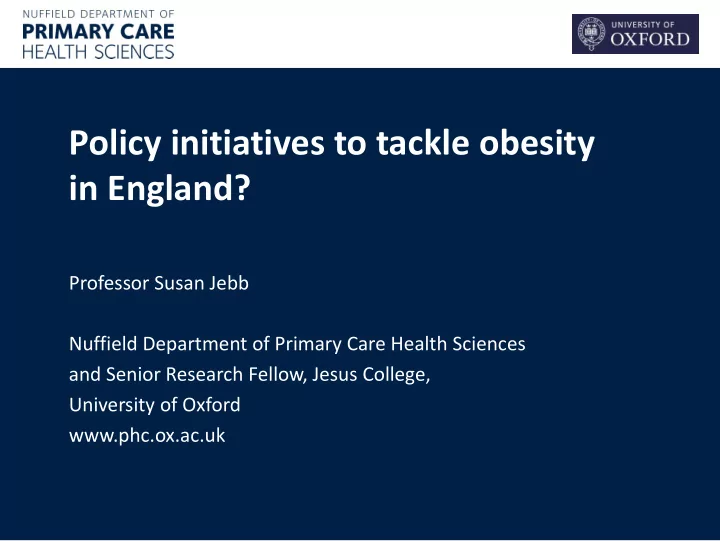

Policy initiatives to tackle obesity in England? Professor Susan Jebb Nuffield Department of Primary Care Health Sciences and Senior Research Fellow, Jesus College, University of Oxford www.phc.ox.ac.uk
Declaration of interests From 2005-2007 I was the lead Science Advisor to the Foresight obesity project From 2007-2011 I chaired the DH Expert Advisory Group on Obesity From 2010-2015 I was Chair of the DH Public Health Responsibility Deal Food Network From 2013-18 I was Chair of the NICE Public Health Advisory Committee A In 2018 I was appointed to the UK Scientific Advisory Committee on Nutrition My research is primarily funded by the National Institute of Health Research (NIHR). Some of my research has been funded by companies providing weight management services (Weight Watchers, Cambridge Weight Plan). In other publically funded trials the treatment intervention is offered by the provider at no cost (Slimming World, Weight Watchers)
PHE Patterns and trends in adult obesity
2008 2011 2016 2018
Obesity prevalence by deprivation decile National Child Measurement Programme 2016/17(1) Calorie reduction: the scope and ambition for action – March 2018
Change4Life: a national social marketing campaign
Nutrition labelling Around two thirds of pre- packaged food carry consistent colour-coded nutrition labelling Partial adoption of calorie- labelling on high street Recent public consultation on mandatory labelling for all out of home food businesses
Voluntary agreements with industry to stimulate product renovation • Builds on successful salt reformulation programme • Public Health Responsibility Deal initiated action on calories – voluntary pledges and self-reporting of progress • Specific targets now set by Public Health England for sugar and calories • Independent monitoring and annual reporting of progress • Threat of stronger action if sufficient progress not achieved
Results after 1 year*: 2% reduction overall (excluding drinks) *2 year data expected next month
Calorie reduction* through smaller portions and reformulation Reductions in fat and sugar across a 250 kcal cap on single bars of confectionery range of products from Mars, Nestle and Mondelez *1 year progress report expected next month
Reformulation: Total sugar content (g/100ml) of soft drink products on the market in 2015 and 2017 Sales weighted average reduction of 11% (2015 and 2017) Decrease of 6% in calories consumed in a single occasion 5-8 g/100 ml: 18p/litre >8 g/100 ml: 24p/litre PHE Sugar reduction and wider reformulation programme: progress report towards 5% and next steps – May 2018
Next steps • Updating school food standards, especially with respect to sugar content • Consultation on mandating consistent calorie labelling for OOH sector • Consultation on extending restrictions on TV advertising of HFSS foods • Consultation on legislation to ban price promotions of unhealthy food and drinks in retail and out of home sector • Review progress on SDIL and consider extending to sugary milk drinks • Consider further use of tax system to promote healthy food if reformulation programme does not deliver sufficient progress • Promote a national ambition for every primary school to adopt an active mile initiative • Develop a trail blazer programme with local authority partners to show what can be achieved to create a healthier food environment
Improving access to obesity treatment
New ambitions to increase access to weight management services: • Doubling National Diabetes Prevention Programme (NDPP) • Offering weight loss in primary care for people who are obese with diabetes or hypertension • Piloting use of TDRs for inducing remission of diabetes
Key challenges • To maintain momentum amidst Brexit (or other political upheaval) • To tackle inequity • To set clear governance frameworks, targets, monitoring and evaluation for food industry actions eg. reformulation • To take legislative action in parallel where policies need to be mandated to be effective eg. marketing • To integrate action at national level with devolved authorities/local government and communities • To embed obesity treatment as part of routine medical care • To build public mandate for intervention
Recommend
More recommend